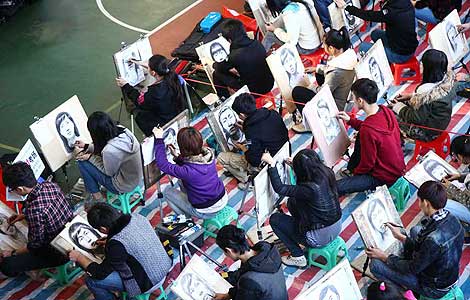Teaching English in China a good Plan B
Updated: 2014-01-17 09:22
By CHEN JIA in San Francisco (China Daily USA)
|
||||||||
If you asked Cody Batchelor, an English teacher in China, a year ago what he planned to do after graduating college, he would have said his first choice was law school.
But the American has never regretted choosing his plan B at the time of spending a year abroad, expanding his horizons, and pursuing his lifelong goal of becoming fluent in a foreign language.
"American students think that by bolstering their background with Chinese language experiences or work experience in China, they will give themselves an edge in competitive job markets back home - or even internationally," he told China Daily. "I used this reasoning to justify taking Mandarin courses at my university."
Also, American students often use study abroad programs as an opportunity to expose themselves to different cultures or gain experience on the international stage, he said.
At a job fair at his university, Batchelor learned about a program called Ameson Year in China (AYC) and made it his back-up before taking the Law School Admissions Test.
As the application, vetting, and qualifying process moved along, Batchelor finally decided on a full-fledged commitment to teaching English in China.
"I figured this would be the ideal time to travel and explore," he said. "I'm young yet mature, unburdened by obligations yet serious about supporting myself financially."
"The AYC program promised to reimburse travel and visa costs, as well as provide housing. So I figured, if anything, I could make a solid income to support my travels around the country or even to other countries, and make monthly student loan payments along the way," he said.
"To kill yet another bird with this stone, I could improve my Chinese language skills when I was immersed in the cultural contexts that drive the practice, use and development of the language," he added.
He was one of 164 AYC participants from 119 universities and colleges last year, and the organizers estimate that number will rise to 500 this year.
The oldest AYC teacher in the group was born in 1969, the youngest in 1993. A total of 116 were born in 1990.
Participants' academic majors and concentrations cover a range of fields, from communications, economics and science to education, criminal justice and English literature.
"China and the United States hope that people-to-people exchanges can play a larger role in their bilateral relationship, and Ameson's AYC program is designed to facilitate such an effort," said Zhu Xiaodi, who runs AYC's office in Washington DC.
"In our view, the best solution is to promote having more Americans to go to live and work and study in China so that they will have a better understanding of the real and true China, both its positive and negative sides," Zhu said.
"We have already received more than 10 US Congressmen's endorsement letters for the program," Zhu added.
For the 2013-14 year, AYC has maintained contact with hundreds of schools all over China, including primary schools, middle schools and high schools, and has successfully established partnerships with roughly 100 schools from more than 12 provinces and 27 cities.
Besides Shanghai, Shenzhen and other metropolitan cities, a great number of participants have been placed in second-tier cities and even rural areas.
Based on recent survey data, more than 100,000 students are being taught by AYC instructors.
"Participants have benefited from the AYC program as well. AYC is a great professional experience for all participants preparing for potential career development in teaching English," said David Lu of AYC's Shanghai office.
Along the way, they have also deepened their understanding of Chinese culture, history and society by participating in a variety of cultural and educational activities, he said.
"They are the practitioners of people-to-people diplomacy in Sino-US bilateral relations," he said. "And I believe these participants will bring their understanding of modern China back home and act as bridge of bilateral relations for the two countries."

 'American Hustle,' 'Gravity' lead Oscar nominations
'American Hustle,' 'Gravity' lead Oscar nominations
 Wildfire out of control in Los Angeles, US
Wildfire out of control in Los Angeles, US
 Way to art school
Way to art school
 'American Hustle,' 'Gravity' lead Oscar nominations
'American Hustle,' 'Gravity' lead Oscar nominations
 138th Westminster Kennel Club Dog Show to open
138th Westminster Kennel Club Dog Show to open
 Volcano displaces thousands in Indonesia
Volcano displaces thousands in Indonesia
 China issues fog alerts
China issues fog alerts
 Stray cats on the way to be slaughtered saved
Stray cats on the way to be slaughtered saved
Most Viewed
Editor's Picks

|

|

|

|

|

|
Today's Top News
China's US debt holdings reach record high
US Treasury chief says high-level engagement 'welcomed'
Asiana firefighters saw victim alive
US 'double standards' threaten other nations
Obama set to speak about NSA
Officials with spouses overseas won't be promoted
Senior general tangled in corruption
Balanced flows draw step closer
US Weekly

|

|






